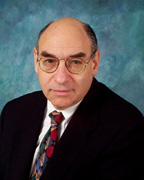 |
Irving Zucker, Ph.D. |
The grant – called a program project grant – was awarded by the National Heart, Lung, and Blood Institute (NHLBI), one of the institutes which make up the NIH in Bethesda, Md. Irving Zucker, Ph.D., professor and chairman of the Cellular and Integrative Physiology Department in the UNMC College of Medicine, is the principal investigator of the grant.
Program project grants are typically larger than grants awarded to individual scientists, as they bring together a group of researchers who collaborate to study a narrow theme. Due to the large value of program project grants, they are extremely competitive.
“We were ecstatic to learn we had five more years of life to gain a better understanding of the mechanism for cardiovascular deterioration in heart failure,” Dr. Zucker said. “Learning more will allow us to develop new and more rational therapies for the treatment of heart failure.”
“This is great news! Dr. Zucker and his team are widely recognized for their research contributions in congestive heart failure,” said UNMC Chancellor Harold M. Maurer, M.D. “The research gives hope to millions living with the disease. We’re delighted that the National Heart, Lung, and Blood Institute has recognized their ground-breaking research in this manner.”
The initial grant has grown from three to four separate projects led by Dr. Zucker, Harold Schultz, Ph.D., Kaushik Patel, Ph.D., and Wei Wang, M.D., Ph.D. All are in UNMC’s Department of Cellular and Integrative Physiology.
Dr. Zucker heads the administrative core of the grant, while Kurtis Cornish, Ph.D., is in charge of the animal model core and Shyamal Roy, Ph.D., directs the molecular biology and histology core.
“One of the most important mechanisms for growth of the UNMC research effort is our ability to obtain, and then retain, funding from the NIH for large-scale program projects like this one,” said Thomas Rosenquist, Ph.D., vice chancellor for research at UNMC. “With this renewal of their NIH program project grant, Dr Zucker and his group confirm their status as world leaders in basic research directed at a cure for congestive heart failure. They are a great model for other UNMC research teams.”
“This is fantastic news,” said John Gollan, M.D., Ph.D., dean of the UNMC College of Medicine. “Dr. Zucker has consistently been one of our very best scientists and he’s progressively grown what is now a national and internationally recognized program in cardiovascular research. This grant is really a culmination of the excellence found in his department. His team’s success lifts our institution into the upper echelon of NIH supported research, which is a great credit to Dr. Zucker and his entire research staff.”
The program project grant is a renewal of an $8 million grant Dr. Zucker’s team first received in 1999.
Today, UNMC has 10 program project grants totaling about $100 million, Dr. Rosenquist said. Dr. Zucker’s grant is one of the four largest program project grants at UNMC, he said.
“The renewal is a very big deal because the money supports a lot of people,” Dr. Zucker said, with upwards of 35 people involved in the work.
The $10.6 million grant includes $3.4 million to cover indirect costs such as laboratory expenses and overhead. With a program project grant, external and internal review committees review progress annually. The team will seek another renewal after the grant period ends in June 2009, Dr. Zucker said.
Using animal models, the UNMC researchers are studying the adjustments that occur in the body when chronic heart failure occurs. They are specifically looking at reactive oxidant stress and its relationship to the sympathetic nervous system and the cardiovascular system.
A person’s cells oxidize as they age. Normally, antioxidant enzymes slow the aging process, but in diseased states antioxidants are decreased and reactive oxidant stress levels are higher. This causes damage to cells and activates the sympathetic nervous system, which, if prolonged, causes further deterioration of the cardiovascular system.
Dr. Zucker’s group wants to understand the cellular and molecular mechanisms that generate reactive oxidant stress, which specifically targets certain types of brain cells when the cardiovascular system fails.
In other areas of the project, investigators are studying why exercise improves the life expectancy and cardiovascular function in patients with heart failure, as well as how exercise relates to reactive oxidant stress and angiotensin II, a small peptide which stimulates production of reactive oxidant stress.
Since receiving the initial grant in 1999, Dr. Zucker’s team has shown:
- Exercise training reduces sympathetic nervous activity and enhances cardiovascular reflexes in heart failure.
- There are changes in the production of specific proteins in parts of the brain, which regulate sympathetic nerve activity.
- Angiotensin II is responsible for setting reactive oxidant stress levels and exercise training reduces those levels. (Angiotensin receptors are increased in heart failure).
Heart failure is a serious condition where the heart cannot pump enough blood throughout the body. According to the National Heart, Lung, and Blood Institute, about 5 million people in the United States have heart failure. It is the number one hospital admission for patients over age 65, Dr. Zucker said. According to the NHLBI, another 550,000 people are diagnosed for the first time each year. The disease, also known as congestive heart failure, contributes to or causes about 300,000 deaths each year.